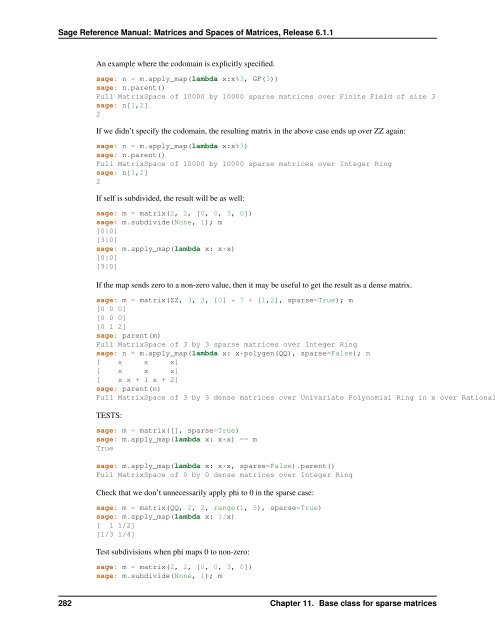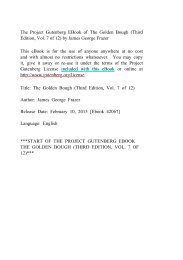- Page 1:
Sage Reference Manual: Matrices and
- Page 4 and 5:
22 Dense matrices over multivariate
- Page 6 and 7:
Sage Reference Manual: Matrices and
- Page 8 and 9:
Sage Reference Manual: Matrices and
- Page 10 and 11:
Sage Reference Manual: Matrices and
- Page 12 and 13:
Sage Reference Manual: Matrices and
- Page 14 and 15:
Sage Reference Manual: Matrices and
- Page 16 and 17:
Sage Reference Manual: Matrices and
- Page 18 and 19:
Sage Reference Manual: Matrices and
- Page 20 and 21:
Sage Reference Manual: Matrices and
- Page 22 and 23:
Sage Reference Manual: Matrices and
- Page 24 and 25:
Sage Reference Manual: Matrices and
- Page 26 and 27:
Sage Reference Manual: Matrices and
- Page 28 and 29:
Sage Reference Manual: Matrices and
- Page 30 and 31:
Sage Reference Manual: Matrices and
- Page 32 and 33:
Sage Reference Manual: Matrices and
- Page 34 and 35:
Sage Reference Manual: Matrices and
- Page 36 and 37:
Sage Reference Manual: Matrices and
- Page 38 and 39:
Sage Reference Manual: Matrices and
- Page 40 and 41:
Sage Reference Manual: Matrices and
- Page 42 and 43:
Sage Reference Manual: Matrices and
- Page 44 and 45:
Sage Reference Manual: Matrices and
- Page 46 and 47:
Sage Reference Manual: Matrices and
- Page 48 and 49:
Sage Reference Manual: Matrices and
- Page 50 and 51:
Sage Reference Manual: Matrices and
- Page 52 and 53:
Sage Reference Manual: Matrices and
- Page 54 and 55:
Sage Reference Manual: Matrices and
- Page 56 and 57:
Sage Reference Manual: Matrices and
- Page 58 and 59:
Sage Reference Manual: Matrices and
- Page 60 and 61:
Sage Reference Manual: Matrices and
- Page 62 and 63:
Sage Reference Manual: Matrices and
- Page 64 and 65:
Sage Reference Manual: Matrices and
- Page 66 and 67:
Sage Reference Manual: Matrices and
- Page 68 and 69:
Sage Reference Manual: Matrices and
- Page 70 and 71:
Sage Reference Manual: Matrices and
- Page 72 and 73:
Sage Reference Manual: Matrices and
- Page 74 and 75:
Sage Reference Manual: Matrices and
- Page 76 and 77:
Sage Reference Manual: Matrices and
- Page 78 and 79:
Sage Reference Manual: Matrices and
- Page 80 and 81:
Sage Reference Manual: Matrices and
- Page 82 and 83:
Sage Reference Manual: Matrices and
- Page 84 and 85:
Sage Reference Manual: Matrices and
- Page 86 and 87:
Sage Reference Manual: Matrices and
- Page 88 and 89:
Sage Reference Manual: Matrices and
- Page 90 and 91:
Sage Reference Manual: Matrices and
- Page 92 and 93:
Sage Reference Manual: Matrices and
- Page 94 and 95:
Sage Reference Manual: Matrices and
- Page 96 and 97:
Sage Reference Manual: Matrices and
- Page 98 and 99:
Sage Reference Manual: Matrices and
- Page 100 and 101:
Sage Reference Manual: Matrices and
- Page 102 and 103:
Sage Reference Manual: Matrices and
- Page 104 and 105:
Sage Reference Manual: Matrices and
- Page 106 and 107:
Sage Reference Manual: Matrices and
- Page 108 and 109:
Sage Reference Manual: Matrices and
- Page 110 and 111:
Sage Reference Manual: Matrices and
- Page 112 and 113:
Sage Reference Manual: Matrices and
- Page 114 and 115:
Sage Reference Manual: Matrices and
- Page 116 and 117:
Sage Reference Manual: Matrices and
- Page 118 and 119:
Sage Reference Manual: Matrices and
- Page 120 and 121:
Sage Reference Manual: Matrices and
- Page 122 and 123:
Sage Reference Manual: Matrices and
- Page 124 and 125:
Sage Reference Manual: Matrices and
- Page 126 and 127:
Sage Reference Manual: Matrices and
- Page 128 and 129:
Sage Reference Manual: Matrices and
- Page 130 and 131:
Sage Reference Manual: Matrices and
- Page 132 and 133:
Sage Reference Manual: Matrices and
- Page 134 and 135:
Sage Reference Manual: Matrices and
- Page 136 and 137:
Sage Reference Manual: Matrices and
- Page 138 and 139:
Sage Reference Manual: Matrices and
- Page 140 and 141:
Sage Reference Manual: Matrices and
- Page 142 and 143:
Sage Reference Manual: Matrices and
- Page 144 and 145:
Sage Reference Manual: Matrices and
- Page 146 and 147:
Sage Reference Manual: Matrices and
- Page 148 and 149:
Sage Reference Manual: Matrices and
- Page 150 and 151:
Sage Reference Manual: Matrices and
- Page 152 and 153:
Sage Reference Manual: Matrices and
- Page 154 and 155:
Sage Reference Manual: Matrices and
- Page 156 and 157:
Sage Reference Manual: Matrices and
- Page 158 and 159:
Sage Reference Manual: Matrices and
- Page 160 and 161:
Sage Reference Manual: Matrices and
- Page 162 and 163:
Sage Reference Manual: Matrices and
- Page 164 and 165:
Sage Reference Manual: Matrices and
- Page 166 and 167:
Sage Reference Manual: Matrices and
- Page 168 and 169:
Sage Reference Manual: Matrices and
- Page 170 and 171:
Sage Reference Manual: Matrices and
- Page 172 and 173:
Sage Reference Manual: Matrices and
- Page 174 and 175:
Sage Reference Manual: Matrices and
- Page 176 and 177:
Sage Reference Manual: Matrices and
- Page 178 and 179:
Sage Reference Manual: Matrices and
- Page 180 and 181:
Sage Reference Manual: Matrices and
- Page 182 and 183:
Sage Reference Manual: Matrices and
- Page 184 and 185:
Sage Reference Manual: Matrices and
- Page 186 and 187:
Sage Reference Manual: Matrices and
- Page 188 and 189:
Sage Reference Manual: Matrices and
- Page 190 and 191:
Sage Reference Manual: Matrices and
- Page 192 and 193:
Sage Reference Manual: Matrices and
- Page 194 and 195:
Sage Reference Manual: Matrices and
- Page 196 and 197:
Sage Reference Manual: Matrices and
- Page 198 and 199:
Sage Reference Manual: Matrices and
- Page 200 and 201:
Sage Reference Manual: Matrices and
- Page 202 and 203:
Sage Reference Manual: Matrices and
- Page 204 and 205:
Sage Reference Manual: Matrices and
- Page 206 and 207:
Sage Reference Manual: Matrices and
- Page 208 and 209:
Sage Reference Manual: Matrices and
- Page 210 and 211:
Sage Reference Manual: Matrices and
- Page 212 and 213:
Sage Reference Manual: Matrices and
- Page 214 and 215:
Sage Reference Manual: Matrices and
- Page 216 and 217:
Sage Reference Manual: Matrices and
- Page 218 and 219:
Sage Reference Manual: Matrices and
- Page 220 and 221:
Sage Reference Manual: Matrices and
- Page 222 and 223:
Sage Reference Manual: Matrices and
- Page 224 and 225:
Sage Reference Manual: Matrices and
- Page 226 and 227:
Sage Reference Manual: Matrices and
- Page 228 and 229:
Sage Reference Manual: Matrices and
- Page 230 and 231:
Sage Reference Manual: Matrices and
- Page 232 and 233:
Sage Reference Manual: Matrices and
- Page 234 and 235:
Sage Reference Manual: Matrices and
- Page 236 and 237: Sage Reference Manual: Matrices and
- Page 238 and 239: Sage Reference Manual: Matrices and
- Page 240 and 241: Sage Reference Manual: Matrices and
- Page 242 and 243: Sage Reference Manual: Matrices and
- Page 244 and 245: Sage Reference Manual: Matrices and
- Page 246 and 247: Sage Reference Manual: Matrices and
- Page 248 and 249: Sage Reference Manual: Matrices and
- Page 250 and 251: Sage Reference Manual: Matrices and
- Page 252 and 253: Sage Reference Manual: Matrices and
- Page 254 and 255: Sage Reference Manual: Matrices and
- Page 256 and 257: Sage Reference Manual: Matrices and
- Page 258 and 259: Sage Reference Manual: Matrices and
- Page 260 and 261: Sage Reference Manual: Matrices and
- Page 262 and 263: Sage Reference Manual: Matrices and
- Page 264 and 265: Sage Reference Manual: Matrices and
- Page 266 and 267: Sage Reference Manual: Matrices and
- Page 268 and 269: Sage Reference Manual: Matrices and
- Page 270 and 271: Sage Reference Manual: Matrices and
- Page 272 and 273: Sage Reference Manual: Matrices and
- Page 274 and 275: Sage Reference Manual: Matrices and
- Page 276 and 277: Sage Reference Manual: Matrices and
- Page 278 and 279: Sage Reference Manual: Matrices and
- Page 280 and 281: Sage Reference Manual: Matrices and
- Page 282 and 283: Sage Reference Manual: Matrices and
- Page 284 and 285: Sage Reference Manual: Matrices and
- Page 288 and 289: Sage Reference Manual: Matrices and
- Page 290 and 291: Sage Reference Manual: Matrices and
- Page 292 and 293: Sage Reference Manual: Matrices and
- Page 294 and 295: Sage Reference Manual: Matrices and
- Page 296 and 297: Sage Reference Manual: Matrices and
- Page 298 and 299: Sage Reference Manual: Matrices and
- Page 300 and 301: Sage Reference Manual: Matrices and
- Page 302 and 303: Sage Reference Manual: Matrices and
- Page 304 and 305: Sage Reference Manual: Matrices and
- Page 306 and 307: Sage Reference Manual: Matrices and
- Page 308 and 309: Sage Reference Manual: Matrices and
- Page 310 and 311: Sage Reference Manual: Matrices and
- Page 312 and 313: Sage Reference Manual: Matrices and
- Page 314 and 315: Sage Reference Manual: Matrices and
- Page 316 and 317: Sage Reference Manual: Matrices and
- Page 318 and 319: Sage Reference Manual: Matrices and
- Page 320 and 321: Sage Reference Manual: Matrices and
- Page 322 and 323: Sage Reference Manual: Matrices and
- Page 324 and 325: Sage Reference Manual: Matrices and
- Page 326 and 327: Sage Reference Manual: Matrices and
- Page 328 and 329: Sage Reference Manual: Matrices and
- Page 330 and 331: Sage Reference Manual: Matrices and
- Page 332 and 333: Sage Reference Manual: Matrices and
- Page 334 and 335: Sage Reference Manual: Matrices and
- Page 336 and 337:
Sage Reference Manual: Matrices and
- Page 338 and 339:
Sage Reference Manual: Matrices and
- Page 340 and 341:
Sage Reference Manual: Matrices and
- Page 342 and 343:
Sage Reference Manual: Matrices and
- Page 344 and 345:
Sage Reference Manual: Matrices and
- Page 346 and 347:
Sage Reference Manual: Matrices and
- Page 348 and 349:
Sage Reference Manual: Matrices and
- Page 350 and 351:
Sage Reference Manual: Matrices and
- Page 352 and 353:
Sage Reference Manual: Matrices and
- Page 354 and 355:
Sage Reference Manual: Matrices and
- Page 356 and 357:
Sage Reference Manual: Matrices and
- Page 358 and 359:
Sage Reference Manual: Matrices and
- Page 360 and 361:
Sage Reference Manual: Matrices and
- Page 362 and 363:
Sage Reference Manual: Matrices and
- Page 364 and 365:
Sage Reference Manual: Matrices and
- Page 366 and 367:
Sage Reference Manual: Matrices and
- Page 368 and 369:
Sage Reference Manual: Matrices and
- Page 370 and 371:
Sage Reference Manual: Matrices and
- Page 372 and 373:
Sage Reference Manual: Matrices and
- Page 374 and 375:
Sage Reference Manual: Matrices and
- Page 376 and 377:
Sage Reference Manual: Matrices and
- Page 378 and 379:
Sage Reference Manual: Matrices and
- Page 380 and 381:
Sage Reference Manual: Matrices and
- Page 382 and 383:
Sage Reference Manual: Matrices and
- Page 384 and 385:
Sage Reference Manual: Matrices and
- Page 386 and 387:
Sage Reference Manual: Matrices and
- Page 388 and 389:
Sage Reference Manual: Matrices and
- Page 390 and 391:
Sage Reference Manual: Matrices and
- Page 392 and 393:
Sage Reference Manual: Matrices and
- Page 394 and 395:
Sage Reference Manual: Matrices and
- Page 396 and 397:
Sage Reference Manual: Matrices and
- Page 398 and 399:
Sage Reference Manual: Matrices and
- Page 400 and 401:
Sage Reference Manual: Matrices and
- Page 402 and 403:
Sage Reference Manual: Matrices and
- Page 404 and 405:
Sage Reference Manual: Matrices and
- Page 406 and 407:
Sage Reference Manual: Matrices and
- Page 408 and 409:
Sage Reference Manual: Matrices and
- Page 410 and 411:
Sage Reference Manual: Matrices and
- Page 412 and 413:
Sage Reference Manual: Matrices and
- Page 414 and 415:
Sage Reference Manual: Matrices and
- Page 416 and 417:
Sage Reference Manual: Matrices and
- Page 418 and 419:
Sage Reference Manual: Matrices and
- Page 420 and 421:
Sage Reference Manual: Matrices and
- Page 422 and 423:
Sage Reference Manual: Matrices and
- Page 424 and 425:
Sage Reference Manual: Matrices and
- Page 426 and 427:
Sage Reference Manual: Matrices and
- Page 428 and 429:
Sage Reference Manual: Matrices and
- Page 430 and 431:
Sage Reference Manual: Matrices and
- Page 432 and 433:
Sage Reference Manual: Matrices and
- Page 434 and 435:
Sage Reference Manual: Matrices and
- Page 436 and 437:
Sage Reference Manual: Matrices and
- Page 438 and 439:
Sage Reference Manual: Matrices and
- Page 440 and 441:
Sage Reference Manual: Matrices and
- Page 442 and 443:
Sage Reference Manual: Matrices and
















